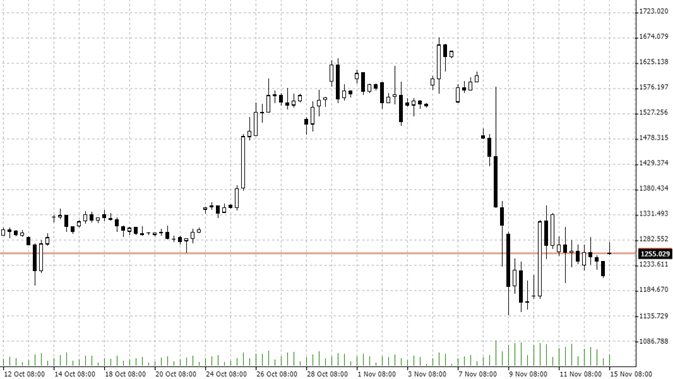

15.11.2022 – After the takeover disaster around FTX, the nerves in the crypto market have calmed down again somewhat. This is because Binance wants to set up a kind of super bailout fund for the industry. We are curious to see whether this will finally remove the doubts. The industry now wants strict supervision.
Ether was also hit hard in the recent crypto crash – here is the four-hour chart. The question is whether a bottom will now form to support a turnaround.

Source: Bernstein Bank GmbH
Yesterday, Monday, Binance CEO Changpeng Zhao, or “CZ” for short, first calmed tempers.
He announced that he would launch a fund to rescue the industry. On the one hand, this was to prevent a domino effect from the FTX bankruptcy; on the other hand, “strong projects” that ran into liquidity bottlenecks were to be supported.
Lender of Last Resort
The silly thing about the matter: unfortunately, CZ did not provide any detailed information about the fund, such as its size and where all the money would come from. Zhao only invited other crypto companies to participate. Interestingly, at the G-20 meeting in Bali, the entrepreneur also called for clear regulations for the industry – usually he himself is rather at loggerheads with regulators. Whether the super fund will remove doubts in the industry is questionable. As already predicted here, confidence is gone for the time being.
Farewell of the institutionals
Pinebridge Investments’ Hani Redha, for example, told Bloomberg news agency that the question of whether cryptos are a potential asset class that every investor should have in their strategic asset allocation is now “completely off the table.” Salman Ahmed, chief investment strategist at fund company Fidelity International, also explained in an interview with the news agency that the collapse of FTX raises questions about the viability of the crypto ecosystem. After all, he said, it has always been difficult to make a case for it, but now the system has come under even more pressure.
Or not
Despite all of this, professionals are also speaking out, and they see good things in the matter. Marion Laboure of Deutsche Bank, for example, said that this second crypto winter also had a positive effect because it brought the whole ecosystem closer to the established financial sector. The FTX crash has dragged long known structural deficiencies to the forefront – insufficient reserves, conflicts of interest, lack of regulation, lack of transparency and unreliable data. Firms in the crypto market must now quickly be brought under the same regulation as the traditional financial sector, he said. JP Morgan’s Steven Alexopoulos echoed similar sentiments, saying, “In fact, we see the establishment of a regulatory framework as the needed catalyst to massively ramp the institutional adoption of crypto.”
With that in mind, so the important thing in the long run will be the fact, know, whether confidence-building regulation of the crypto market is really coming. So keep an eye on the political real-time news as well. Bernstein Bank wishes successful trades and investments!
__________________________________________________________________________________________
The content of this publication is for general information purposes only. In this context, it is neither an individual investment recommendation or advice nor an offer to purchase or sell securities or other financial products. The content in question and all the information contained therein do not in any way replace individual investor- or investment-oriented advice. No reliable forecast or indication for the future is possible with respect to any presentation or information on the present or past performance of the relevant underlying assets. All information and data presented in this publication are based on reliable sources. However, Bernstein Bank does not guarantee that the information and data contained in this publication is up-to-date, correct and complete. Securities traded on the financial markets are subject to price fluctuations. A contract for difference (CFD) is also a financial instrument with leverage effect. Against this backdrop, CFD trading involves a high risk up to the point of total loss and may not be suitable for all investors. Therefore, make sure that you have fully understood all the correlating risks. If necessary, ask for independent advice. CFDs are complex instruments and are associated with the high risk of losing money quickly because of the leverage effect. 68% of retail investor accounts lose money trading CFD with this provider. You should consider whether you understand how CFD work and whether you can afford to take the high risk of losing your money.7
